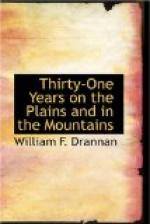Not until now did I tell Uncle Kit of the prank I played on the black tyrant. I also told him why I was so anxious to get away from St. Louis. That it was I feared Drake would discover me and take me back to his farm and the society of his slaves.
Mr. Hughes here interrupted me to say: “Well Willie, you are safe enough from Drake and the wench, but I think by the time you get out o’ here in the spring, you would much rather be with them.”
I assured him, however, that he was mistaken, and that I was bent on being a hunter and trapper.
“And an Indian fighter?” he added.
“Yes, and an Indian fighter, too, if you like;” I replied.
Well, we remained at this camp all winter, not seeing a person outside of our own crowd, and to take it on the whole, it was one of the most enjoyable winters of my life. It being my first winter in the mountains, I was learning something new every day, and whenever I found the track of any wild animal that I was not acquainted with, I would report to Uncle Kit, and he would go miles with me to see the sign, and would take great pains to tell me what sort of an animal it was and all about its nature and habits.
This was one of the most successful winter’s trapping he had ever had, as we were on entirely new ground, where trapping had not been done before, and, moreover, the weather was particularly favorable.
Winter began to break up about a month earlier than usual, it being toward the last days of March when the snow commenced going off. We then took a pair of blankets each, and enough provisions to last us on our trip, and started for Taos, the only kind of provisions we had left being dried elk and venison. It was an easy matter to cure meat in this style in that country, for the air is so light that meat stuck upon the top of a pole eight or ten feet high, will quickly become dried, or “jerked.” Trappers seldom take enough flour and coffee to last all winter, as it made too much bulk and weight to pack so far. Sugar was almost unknown in a trapper camp.
The second day after leaving the dug-out we met Juan, the Mexican boy. He was not bringing our horses, but was carrying a letter for Uncle Kit, from Col. John C. Fremont, asking him to come to Taos, as he wished to employ him as guide for his expedition to California.
That evening, after reading the letter, Uncle Kit said: “Willie, I have got to go to California in the summer to pilot Col. Fremont through. Do you want to go along?”
I said I was perfectly willing to go anywhere that he went.
He said: “We will pass through some mighty rough country, and also through the country of the Utes. If you go, you will, no doubt, have plenty of chances to try your hand at shootin’ Injuns, for them Utes are tough nuts.”
That didn’t scare me a bit, for I was now sixteen years’ old, had killed and scalped two Indians, and had already begun to consider myself a hunter and Indian fighter from away back. Besides, when the story of my killing the two Indians got out, I came to be generally called “the boy scalper.” But Uncle Kit never spoke of me in that way, for he always respected me as a father would his own son.




